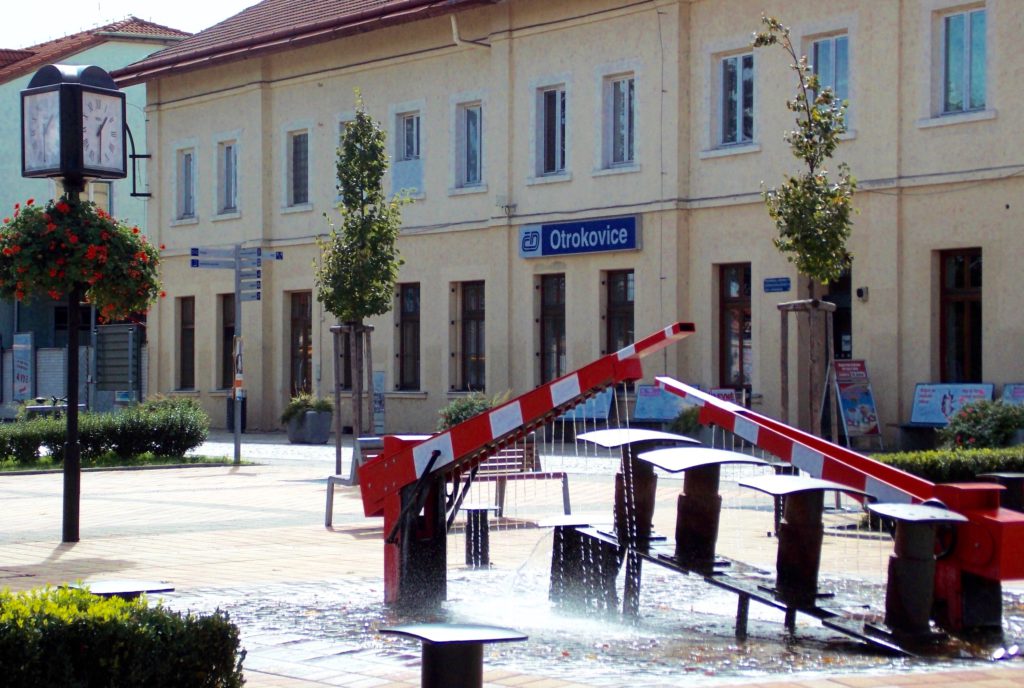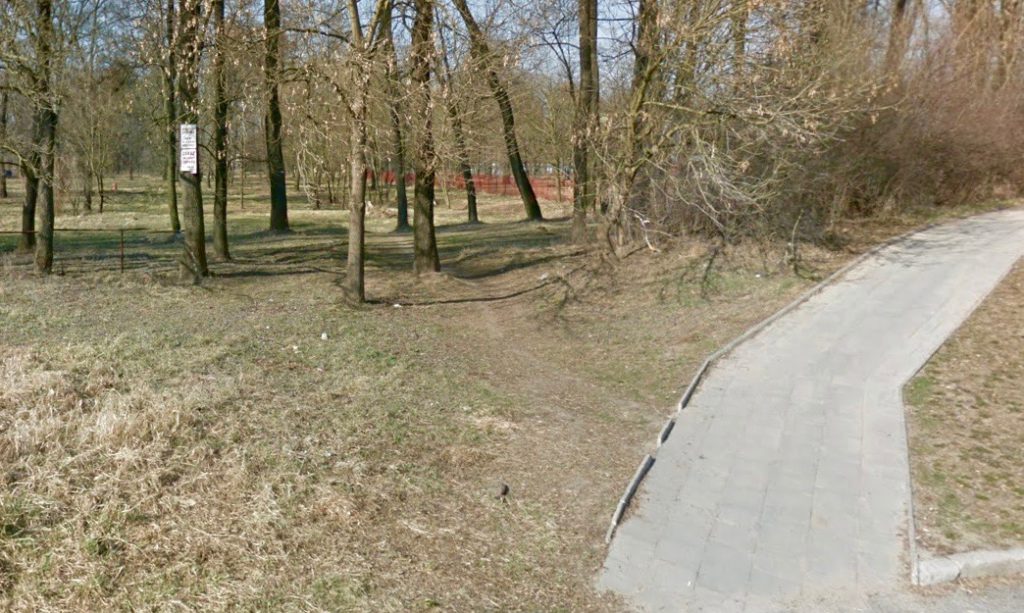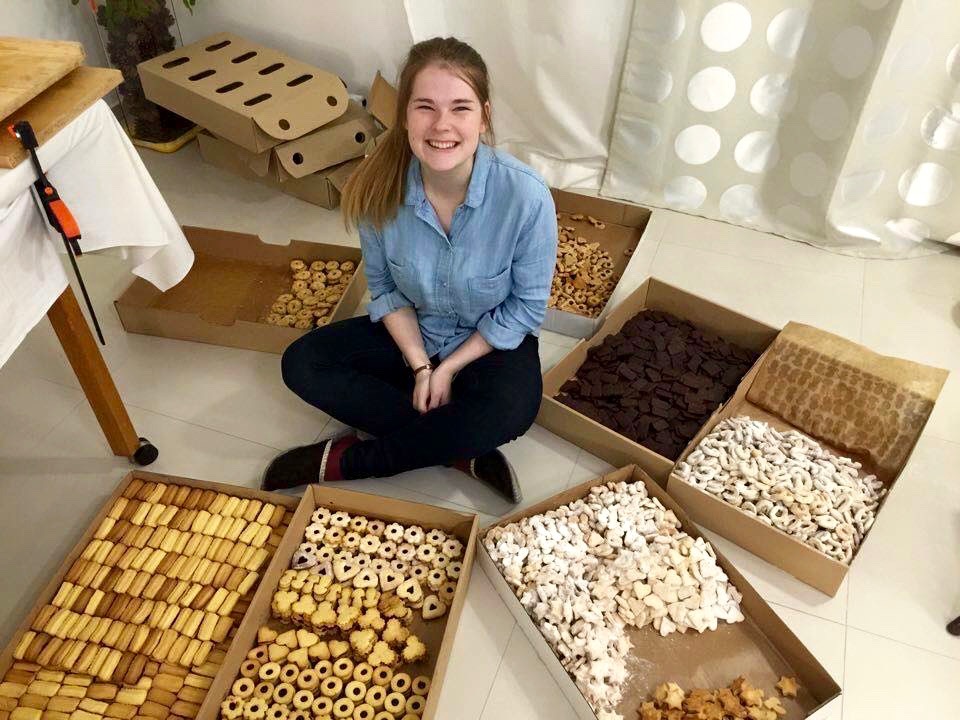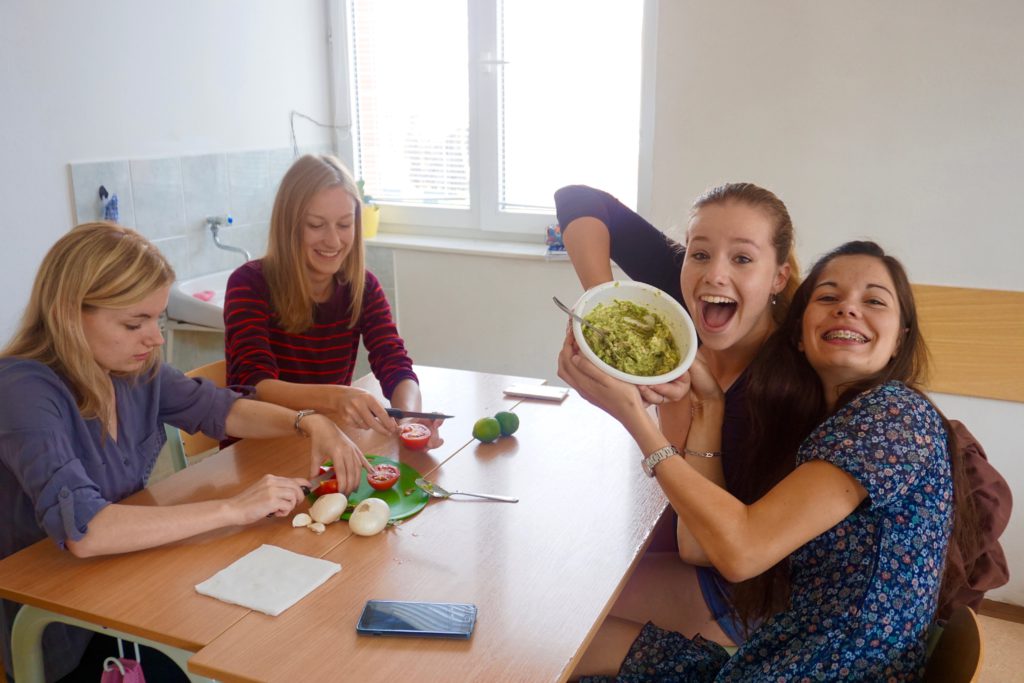
Guest author Brianna Adams shares her experience as a Fulbright English Teaching Assistant (ETA) in the Czech Republic. This year-long program is designed for recent graduates or young professional with an interest in English education and cultural diplomacy. ETAs are placed in English classes overseas to assist teachers, implement new literacy programs, and serve as a cultural ambassador to the U.S.
By Guest Author Brianna Adams
I vividly remember the first walk I took in my new town. It was an unusually hot summer day for the Czech Republic, yet the heat wasn’t what made this day any more memorable than the sweltering days that followed. (It was strange for a Texan to set foot in a European country only to find out that the temperature there rivaled the temperature back home.) The part of this memory that surges to the forefront of my mind is the image of a red and white metal sign posted onto a tree at the beginning of a narrow trail. And as soon as that image comes to mind, I recall how I felt: unsure, vulnerable, and irrationally fearful.
I had pushed myself to the edge of my new neighborhood and on my right, past the metal sign, a trail wound invitingly through a clearing peppered with trees. However, the red lettering on the sign gave me reason to pause. The color scheme was a bit foreboding, and the sign was in Czech and therefore entirely unintelligible to me. (I arrived knowing little more than hello despite attempts to learn Czech via Mango Languages.) I stopped shortly before it, wanting so badly to step past that sign into the area beyond and trying to reassure myself that the sign was of no consequence. But the red letters weren’t all that reassuring, and I couldn’t shake my first tentative thought: “What if this sign says, Stop! No trespassing!” which of course was followed by my second paranoid thought, “Oh my gosh! And then what if a Czech police officer asks me what I’m doing, and all I can do is say hello in Czech followed and frantically pantomime?!?” While I stood there awkwardly and went through this internal dialogue, a mother and her son came out of their apartment, glanced briefly at me (no doubt while I was still staring, deeply in thought, at the sign) and then nonchalantly walked past and right onto the trail. Mystery solved. The sign obviously wasn’t a big deal. The police wouldn’t come out to get me. I would later learn from a student that the sign merely said, “BAN ON DUMPING WASTE.”

Those initial feelings of vulnerability and apprehension gradually wore off as people came into my life and brought with them new lessons about Czech culture and day-to-day life. Czech hospitality seemed to know no bounds, and I quickly fell into step with life in Otrokovice. Every stranger’s act of kindness was magnified tenfold because it reached across communication barriers. By inviting me along to cultural events and sharing meals with me, community members allowed me to become personally invested in their country’s culture and partake in it as someone positioned on the inside. These weren’t the type of haphazard kindnesses that one might expect to encounter throughout the course of a week but rather intentional attempts to enfold me into the community and take away my “foreign-ness.” They voluntarily drew me away from the periphery and towards the center of their lives and thus towards the very heart of the country’s culture.
The process of moving towards “center” began in the classroom. Each Fulbright ETA’s responsibilities differ from country to country and school to school. I taught at Gymnázium Otrokovice, a grammar school for students ages 11 – 19. I taught 20 hours per week and rotated between every English class in the school. Logistically, this meant that I taught some classes every other week and a select few weekly. In total, I taught 320 students! Trying to develop meaningful relationships with so many students – especially when I only saw some of them for 45 minutes every two weeks – was initially daunting. I feared that it would impede my ability to develop classroom culture and affect student participation in class. While the first few months were difficult, I grew to love my teaching schedule because I knew every student by name and therefore felt incredibly connected to the school and the local community. The faculty at my school also took great efforts to incorporate me into the rhythms of the school year by inviting me to special school events, local festivals, and taking me along on school trips.
Outside of school hours, building community was undoubtedly harder. I lived in a town of 19,000 where family life was a huge priority. As a newcomer, I found it hard to find my place in town since I didn’t have a family to spend time with over the weekends. While I did meet other people who were in the same stage of life as I was in a nearby city (45 minutes away by bus), I realized that it was unsustainable to meet up with them often during the week. Therefore, I quickly resolved to invest in my local community and to say yes to any invitation I received. When my mentor teacher arranged for me to join the local women’s choir after I casually mentioned my love for singing, I agreed to try it out. The idea of waltzing into a room full of strangers, especially when I still didn’t have a great grasp of Czech, was intimidating, but I am so glad that I said yes. I became friends with so many women even though we could only communicate with each other in Czech . By the end of the year, I even ended up going on day trips with several choir members and was “adopted” into several families. Furthermore, my Czech drastically improved since I couldn’t fall back on my English. I became a better teacher because I was able to empathize with my students and encourage them to speak freely by sharing the many ridiculous mistakes I had made when attempting to speak Czech.

My Fulbright year reinforced how I viewed my responsibilities as an American abroad, but it revolutionized how I viewed them as an American at home. As an ETA, I knew that I was serving not only as a teacher, but also an ambassador for the United States in my host country. Upon returning home, I realized that I could be just as active in the global community stateside. Now, I am much more sensitive to the needs of the international community in Dallas. Without experiencing firsthand the hospitality of strangers in a land that was not my own, I would have underestimated the importance of seeking out and welcoming the international community in the United States. Promoting mutual understanding and international goodwill lies at the heart of the Fulbright program’s mission, and I am thankful that my year serving as an English Teaching Assistant in the Czech Republic opened my eyes to the ways in which I can continue to carry out that mission stateside.
I imagine that those contemplating whether to apply for a Fulbright English Teaching Assistantship are considering how this might fit into your future plans. Fulbright relates directly to a number of careers – academia, international relations, secondary education, etc. However, at times, making linear connections between the present and the future seems like looking into a crystal ball (especially for those of us who thrive off of spontaneity and hardly ever stick to their five-year plan). For anyone having trouble predicting how the Fulbright might shape your future, consider that learning how to build community and to develop relationships across perceived cultural boundaries is a skill that is crucial not only for professional development but for personal development as well.

Before beginning my Fulbright year, it had been awhile since I had tried something and failed in a very big way. While I was wrestling with the new teacher learning curve, I learned how to extend grace to myself and how to maintain high expectations without beating myself up over failing to meet them. I remember several times when I spent all night crafting a great lesson plan only to see it fall to pieces in class the next day. I am thankful for those experiences. I gradually became less risk-averse and more resilient. Above all, being on the receiving end of so much hospitality and generosity drove me to incorporate those values into my daily life when I returned to the United States.
Today, I found myself translating the word “PELIGRO!” on a red and white metal sign to two new Czech friends who recently arrived in the United States as we walked through a wooded park in Dallas. I couldn’t make this up if I tried.
Brianna Adams served as a Fulbright English Teaching Assistant in Otrokovice, Czech Republic from September 2015 to June 2016. She is originally from Garland, Texas and graduated from the University of Alabama in May 2015 with a Bachelor of Arts in English Literature.
© Victoria Johnson 2016, all rights reserved.